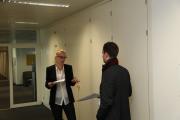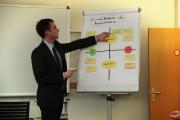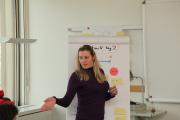Conflicts are dynamic processes, which can be categorized in different ways and manners. On an abstract level, differences can be made between internal, social and structural conflicts. But what is the concrete significance of this and which repertoire of tools and methods is necessary to solve the different types of conflicts?
The solution of a social conflict may require e.g. in the form of a relationship conflict, a high level of empathy, readiness to compromise and sympathy for the conflict partner. One tool is a change in perspective, to try and gain the other`s view and identify his or her interests and desires and understand them.
Structural conflicts, e.g. a conflict in goals, require a careful evaluation of all advantages and disadvantages, and that these conflicts are addressed constructively. By the explanation of one’s perspective, effects and feelings are expressed and the evaluation of the counterparty is requested, a satisfactory résumé can be drawn for both sides.
Role, distribution, and assessment conflicts are more possible types of conflict which require, just as in the example above, a high level of emotional intelligence. Also when categorizing the conflict partner a type of personality is involved here. ´Endurance`, ´closeness` and ´change` are types of personality which inherit different desires and escalation potential. For example the personality type ‘change` needs a certain level of freedom for creativity and feels constrained by too many rules.
It is not always possible to solve conflicts. But even if conflicts escalate there are possibilities to bring along a solution. This depends on the level of escalation one is at. At the beginning of an escalation, when the frontiers already have toughened, the possibility remains to find a solution for both parties together, e.g. by a compromise. If this is not possible anymore a solution is only feasible by using the assistance of a neutral mediator. If this approach fails as well, a solution must be introduced by an external power e.g. by the department leader expressing a decree of demand.
This and many more important details of conflict negotiations; the preparation to the entry of the negotiation; the clearing up to the solution; were contents of the 3 day course in Zürich, with Dr. Markus Wilhelm, professional management consultant and coach, as the lecturer. At the end of the course all students agreed that the basis of constructive conflict mastering is made in the preparation of the negotiation, which in reality, in most instances, is not done. The second important insight is that in many cases too little time is used for actually solving the conflict. Often solutions which are goal leading in the specific case are agreed on too rapidly but they do not solve the real conflict.
Milian – IMP student











